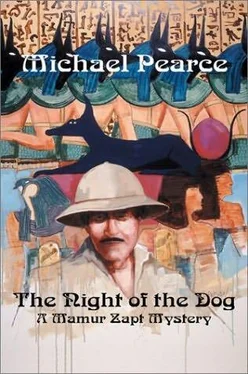Michael Pearce - The Mamur Zapt and the Night of the Dog
Здесь есть возможность читать онлайн «Michael Pearce - The Mamur Zapt and the Night of the Dog» — ознакомительный отрывок электронной книги совершенно бесплатно, а после прочтения отрывка купить полную версию. В некоторых случаях можно слушать аудио, скачать через торрент в формате fb2 и присутствует краткое содержание. Жанр: Исторический детектив, на английском языке. Описание произведения, (предисловие) а так же отзывы посетителей доступны на портале библиотеки ЛибКат.
- Название:The Mamur Zapt and the Night of the Dog
- Автор:
- Жанр:
- Год:неизвестен
- ISBN:нет данных
- Рейтинг книги:3 / 5. Голосов: 1
-
Избранное:Добавить в избранное
- Отзывы:
-
Ваша оценка:
- 60
- 1
- 2
- 3
- 4
- 5
The Mamur Zapt and the Night of the Dog: краткое содержание, описание и аннотация
Предлагаем к чтению аннотацию, описание, краткое содержание или предисловие (зависит от того, что написал сам автор книги «The Mamur Zapt and the Night of the Dog»). Если вы не нашли необходимую информацию о книге — напишите в комментариях, мы постараемся отыскать её.
The Mamur Zapt and the Night of the Dog — читать онлайн ознакомительный отрывок
Ниже представлен текст книги, разбитый по страницам. Система сохранения места последней прочитанной страницы, позволяет с удобством читать онлайн бесплатно книгу «The Mamur Zapt and the Night of the Dog», без необходимости каждый раз заново искать на чём Вы остановились. Поставьте закладку, и сможете в любой момент перейти на страницу, на которой закончили чтение.
Интервал:
Закладка:
The leaflet accused the Moslems of kidnapping children and using them for ritual purposes. Afterwards, it was alleged, the victims were placed in the children’s brothels in which Cairo abounded. There was, of course, no point in trying to check the veracity of the allegations. The matter was mystic as much as factual, drawn from deep-lying sub-strata of racial prejudice and religious fear. Similar accusations were made at different times against all the churches. They surfaced at intervals, burned hot for a time and then slipped back underground, to be stored again in layers of social and religious memory.
If there were leaflets there was organization. And if there was organization there was money. And if there was organization and money, then there was design and planning. The incidents were not spontaneous. They were part of a pattern. He had hoped that the affair of the dog and the death of the Zikr were isolated instances, that with the death of those responsible the matter could end there.
It looked as if it was only beginning.
CHAPTER 9
The Moslem response was not long in coming. Fighting broke out in one of the markets, two people were stabbed and a third sprained his ankle when a stall of onions collapsed. The stab wounds were presented to Owen when he went down to inspect. Both victims were brought to him limp in the arms of their supporters and their condition appeared dire. However, closer inspection suggested that the volume of groans was in inverse proportion to the extent of the damage and Owen soon pushed them away. More important was the fact that one was a Copt and one a Moslem, which gave hope that, honour being satisfied on both sides, the exchanges might not be carried further. He lectured all sides sternly, posted a constable conspicuously, and went back to his office relieved that matters were no worse.
Over the next few days, however, there were a number of such incidents and some of them did not end so happily. There were other stabbings, some of them serious. Attacks on individuals became so frequent that there were notably fewer people on the streets after dark than was usual. Gangs of youths gathered outside shops. At first they contented themselves with shouting insults and throwing stones. Then one gang went further. It broke into a shop and wrecked it, terrifying the owner. After that, such attacks became the pattern and often, now, the attackers were not satisfied with merely terrifying the owners, they beat them up as well. One gang set fire to a shop after wrecking it and then that too became a feature of the attacks.
Similar incidents occurred all over the Old City and the manpower Owen could command was stretched to its limit. McPhee had all the ordinary police out in support and Garvin brought in extra police from the country districts around Cairo.
“We need more,” said Owen. “It’s still growing. That won’t be enough.”
“It’s got to be enough,” said Garvin. “There aren’t any more.”
“Can’t you transfer some from Alexandria?”
“What happens if it spreads there?”
“It would be better to have city police. They’re better at this sort of thing.”
The country police were sufficiently confused simply by being in a big city, without adding in all the complex requirements of urban policing under riot conditions.
“Can’t you grow your own?” asked Garvin. “Take more people onto your payroll?”
“Haven’t the money,” said Owen, remembering the Curbash Compensation Fund with bitterness. “I spoke to you about that.”
“I suppose I could try again,” said Garvin. “There might be some spare cash floating around since it’s getting near the end of the year.”
He rang back later.
“No chance,” he said. “They’re up to their eyeballs in balance sheets, especially with Postlethwaite looking over their shoulder, and won’t even listen to me.”
“They’re all bloody Copts in the Ministry of Finance, that’s the trouble,” said Owen.
The pressure now, though, seemed to be coming from the Moslem side. Crowds gathered outside the main mosques and there were huge demonstrations; spontaneous, according to the Moslems, organized according to Owen.
“Osman?” he asked Georgiades.
Georgiades nodded. He had been out on the streets all day and his face was running with sweat.
“Yes,” he said. “Osman. Plus money.”
The following evening there was a particularly ugly incident, although this time, against the tide, it appeared to be the Copts who were responsible.
It took place not at the Blue Mosque but further along the street in front of the great Mosque of el-Mouayad. Some Moslem students who had been visiting the mosque were set upon as they left by a much larger gang of Copts and in the fracas at least one of the students appeared to have been killed. Owen was unable to check every incident himself and sent one of his men over. The agent, a good one, reported that the affair wasn’t quite as dramatic as first accounts had suggested and had been on a far smaller scale, but that students had definitely been involved and at least one of them appeared badly hurt. The involvement of students was something that Owen had been hoping to avoid. The students of el-Azhar, the great Moslem university of Cairo, were only too ready to take to the streets in defence of religion or, indeed, anything at all, and once they were participating it would be very difficult to keep the matter localized. His worst fears were realized when the next day word came from Georgiades that a monster procession was being formed which would march from the gates of el-Azhar through the Old City to converge on the Mar Girgis, where a demonstration was planned.
The only good thing about all this was that the procession was going to march through the Old City.
“It will be a shambles,” Nikos confidently predicted.
And on the whole it was. The streets were thin and crowded anyway. When hundreds of students tried to proceed along them they very speedily became totally blocked. The organizers of the march had foolishly neglected to warn the shopkeepers in advance, with the result that shops were still open and their goods, as was the custom with Cairo shops, spread across the pavement. Agitated shopkeepers rushed out into the street when they saw the marchers approaching and tried to rescue their wares. The marchers, who were initially good-humoured, slowed down in an effort to help. Those behind ran into those in front, some tried to crowd past, and in a very short time the result was, as Nikos had forecast, a shambles. One bewildered donkey was enough to block off a street-and that was without any help from Owen.
The marchers became impatient with the slowness of their progress and spread into neighbouring streets. These filled up and blocked too and the whole Old City was brought to a standstill. Confused marchers mingled with bewildered shoppers, excited but ill-informed spectators tried to sort things out and soon everything was in total chaos.
It was hours before the first students managed to permeate the streets and come to within a hundred yards of the Mar Girgis.
Where Owen was waiting. McPhee had put carts across all the streets leading to the church, barricading them completely. In front of each barricade a row of hefty constables was drawn up with truncheons in their hands. Behind the carts were other men. Owen took care to let the demonstrators see that these were armed.
The demonstrators came to a halt. Because they had arrived independently and in twos and threes they had outstripped their organizers and were at a loss what to do. As their numbers grew they formed a wedge between the barricades and the main body of the procession, which was forced to stop short some way away from the barricades.
Читать дальшеИнтервал:
Закладка:
Похожие книги на «The Mamur Zapt and the Night of the Dog»
Представляем Вашему вниманию похожие книги на «The Mamur Zapt and the Night of the Dog» списком для выбора. Мы отобрали схожую по названию и смыслу литературу в надежде предоставить читателям больше вариантов отыскать новые, интересные, ещё непрочитанные произведения.
Обсуждение, отзывы о книге «The Mamur Zapt and the Night of the Dog» и просто собственные мнения читателей. Оставьте ваши комментарии, напишите, что Вы думаете о произведении, его смысле или главных героях. Укажите что конкретно понравилось, а что нет, и почему Вы так считаете.












